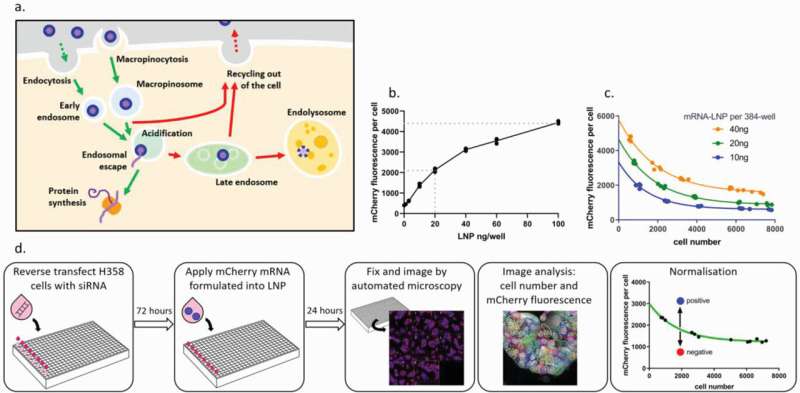
New research from Cardiff University, in collaboration with Astra Zeneca, used artificial intelligence to create microscopic particles that can effectively transport medicines to precisely target and treat diseased cells.
The team say their work has potential future applications in treating genetic diseases and cancer as well as infectious disease. The research, “Understanding intracellular biology to improve mRNA delivery by lipid nanoparticles,” was published in Small Methods.
Professor Arwyn T Jones, Cardiff University’s School of Pharmacy and Pharmaceutical sciences, said, “We are continually looking for new and improved ways of delivering drugs around the human body. Nanoparticles are tiny particles that can act as microscopic shuttles to transport and deliver therapeutic molecules—medications —around the body to reach the specific site that needs therapeutic intervention.
“By taking these drug molecules to the right location in the body, the nanoparticles can help to treat several different diseases.”
This collaborative study used AI to design a bespoke nanoparticle to deliver a drug molecule, called mRNA, to cancer cells. This AI-designed nanoparticle was then proven to be more effective as a delivery shuttle compared with other prototypes.
“This research showed that machine learning and artificial intelligence can form an integral part of the design process for constructing more effective nano therapeutics.
“While the nanoparticle generated through this study was within a narrow field of biomedical research, the new technique—based on computational learning and subsequent design of a new nanoparticle shuttle—was proven to be effective. This means this new technique could be used to analyze and design thousands of different types of nanoparticles and deliver hundreds of different types of therapeutic molecules to target a very wide range of diseases,” added Professor Jones.
Nanoparticles are currently used in medical treatment, however scientists manufacture and test often hundreds of nanoparticle designs before identifying the best one—a process that can take years. This new method shows how AI can rapidly accelerate the development of nanoparticles.
“This approach gains information on how cells and proteins in cells regulate the performance of nanoparticles as drug delivery agents. It clearly demonstrates that machine learning can make a significant contribution to efficiently design more effective nanotherapeutics to better target and treat disease,” added Professor Jones.
More information:
Morag Rose Hunter et al, Understanding Intracellular Biology to Improve mRNA Delivery by Lipid Nanoparticles, Small Methods (2023). DOI: 10.1002/smtd.202201695
Provided by
Cardiff University
Citation:
AI-generated nanoparticles prove capable of delivering modern medicines to diseased cells (2023, June 29)
retrieved 29 June 2023
from https://phys.org/news/2023-06-ai-generated-nanoparticles-capable-modern-medicines.html
This document is subject to copyright. Apart from any fair dealing for the purpose of private study or research, no
part may be reproduced without the written permission. The content is provided for information purposes only.









